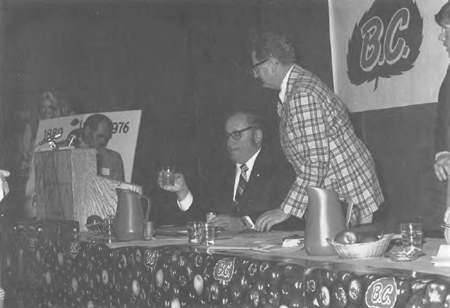Return of Social Credit Government and the Rise of Economic Conservatism
In December, 1975, the New Democratic government was defeated in a provincial general election and Social Credit resumed its rule of the province which, except for the recent three year stint by the New Democratic Party, had been continuous since 1952. For the short term, the new government of Premier Bill Bennett followed the previous government’s precedent by reactivating the Select Standing Committee on Agriculture. It instructed Dr. Hudson to make another report. For the long term, the provincial government’s espousal of market-oriented economic theory meant a change in its attitude towards the B.C.F.G.A., the B.C. Fruit Board, and B.C. Tree Fruits.

Such market-driven economic policy does not favour cooperatives or marketing boards agreeing to a minimum price at which tree fruit or anything else should be sold. It does not favourably regard programs of income stabilization (such as F.I.A.) to level out the peaks and valleys of grower income. Proponents of market-oriented economic policy would say that growers on the low end of the income scale should stop farming if they cannot survive without government assistance. Since this policy favours individual competition, it negates the spirit of working together for the good of the whole as practiced by cooperatives, marketing boards, or, for that matter, the B.C.F.G.A.
Therefore, it is not surprising that, despite the good will of various Ministers of Agriculture, the Social Credit government since 1975 has contemplated the termination of Farm Income Assurance, tampered with the Agricultural Land Reserves, and appointed a board which terminated mandatory one-desk selling for export sales of tree fruits.







